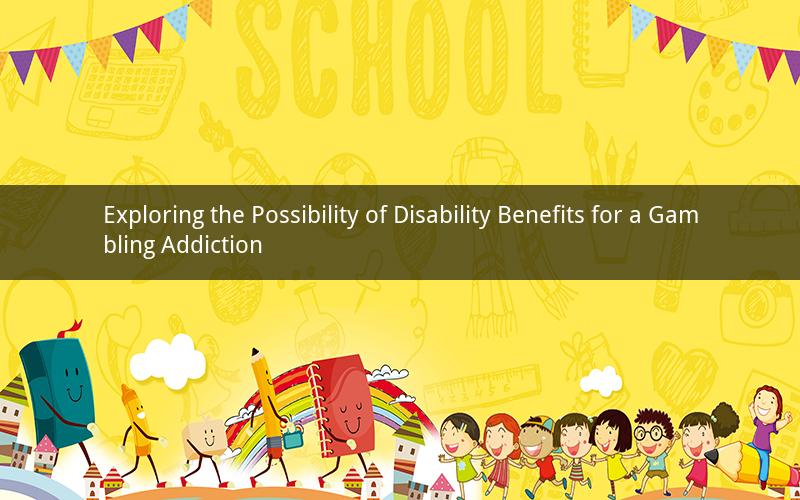
Gambling addiction is a complex issue that can lead to severe personal, financial, and psychological consequences. With the increasing recognition of gambling addiction as a mental health disorder, individuals suffering from this condition may be eligible for disability benefits. This article delves into the topic of whether someone can obtain disability for a gambling addiction, providing insights into the process, requirements, and challenges involved.
I. Understanding Gambling Addiction
Gambling addiction, also known as gambling disorder, is characterized by the inability to control or stop engaging in gambling activities despite the negative consequences. This condition can significantly disrupt an individual's life, affecting relationships, employment, and financial stability. According to the American Psychiatric Association, gambling addiction is classified under the category of substance-related and addictive disorders in the Diagnostic and Statistical Manual of Mental Disorders (DSM-5).
II. Eligibility for Disability Benefits
In many countries, individuals with gambling addiction may be eligible for disability benefits if they meet specific criteria. These criteria typically include a diagnosis of gambling addiction, proof of its impact on the individual's life, and the requirement for ongoing treatment or support.
A. Diagnosis of Gambling Addiction
The first step in obtaining disability benefits for a gambling addiction is obtaining a diagnosis. Mental health professionals, such as psychiatrists or psychologists, can provide a formal diagnosis based on the individual's symptoms and history. The DSM-5 outlines the specific criteria that must be met to diagnose gambling addiction, including the individual's inability to control gambling, preoccupation with gambling, and experiencing distress or significant problems due to gambling.
B. Proof of Impact on Life
To qualify for disability benefits, individuals must provide evidence of how gambling addiction has impacted their life. This may include proof of financial difficulties, employment issues, strained relationships, or mental health problems resulting from the addiction. Documentation such as financial statements, employment records, or letters from friends and family can be used to demonstrate the negative consequences of the addiction.
C. Requirement for Ongoing Treatment or Support
Many disability programs require individuals to undergo ongoing treatment or support to be eligible for benefits. This may involve attending therapy sessions, participating in support groups, or engaging in other forms of rehabilitation. Providing evidence of active participation in treatment can strengthen the case for disability benefits.
III. Challenges and Considerations
While individuals with gambling addiction may be eligible for disability benefits, there are several challenges and considerations to keep in mind:
A. Stigma and Discrimination
Gambling addiction carries a significant stigma, and individuals may face discrimination when seeking disability benefits. This can make the process of obtaining benefits more challenging, as individuals may be hesitant to disclose their addiction or seek treatment.
B. Financial Constraints
The cost of treatment and support for gambling addiction can be significant, making it difficult for individuals to afford the necessary services. Financial constraints can also impact the ability to gather evidence and documentation for disability benefits.
C. Legal and Administrative Hurdles
Navigating the legal and administrative process of applying for disability benefits can be complex and time-consuming. Understanding the specific requirements and procedures for each country or region is crucial to successfully obtain benefits.
IV. Countries and Regions with Disability Benefits for Gambling Addiction
Several countries and regions offer disability benefits for individuals with gambling addiction. Some notable examples include:
A. United States
In the United States, individuals with gambling addiction may be eligible for Social Security Disability Insurance (SSDI) or Supplemental Security Income (SSI) if they meet the required criteria. The Social Security Administration (SSA) evaluates each case individually, taking into account the individual's medical condition, work history, and financial situation.
B. United Kingdom
The United Kingdom's Department for Work and Pensions offers Employment and Support Allowance (ESA) to individuals with a range of disabilities, including gambling addiction. The assessment process involves considering the individual's capability for work and the support they may need to achieve their goals.
C. Australia
In Australia, individuals with gambling addiction may be eligible for a range of benefits, including the Disability Support Pension (DSP). The Department of Human Services assesses each case individually, considering the individual's functional capacity and financial situation.
V. Conclusion
While obtaining disability benefits for a gambling addiction can be challenging, it is possible for individuals to navigate the process successfully. Understanding the criteria, gathering the necessary documentation, and seeking support from mental health professionals and advocacy organizations can increase the chances of obtaining benefits. As awareness and understanding of gambling addiction continue to grow, more individuals may be able to access the support and resources they need to overcome this challenging condition.
Questions:
1. What are the main criteria for obtaining disability benefits for a gambling addiction?
2. Can individuals with gambling addiction receive disability benefits if they are still engaging in gambling activities?
3. Are there any specific types of treatment or support that are required for individuals seeking disability benefits for a gambling addiction?
4. How can individuals overcome the stigma associated with seeking disability benefits for a gambling addiction?
5. What resources are available to individuals seeking assistance in obtaining disability benefits for a gambling addiction?